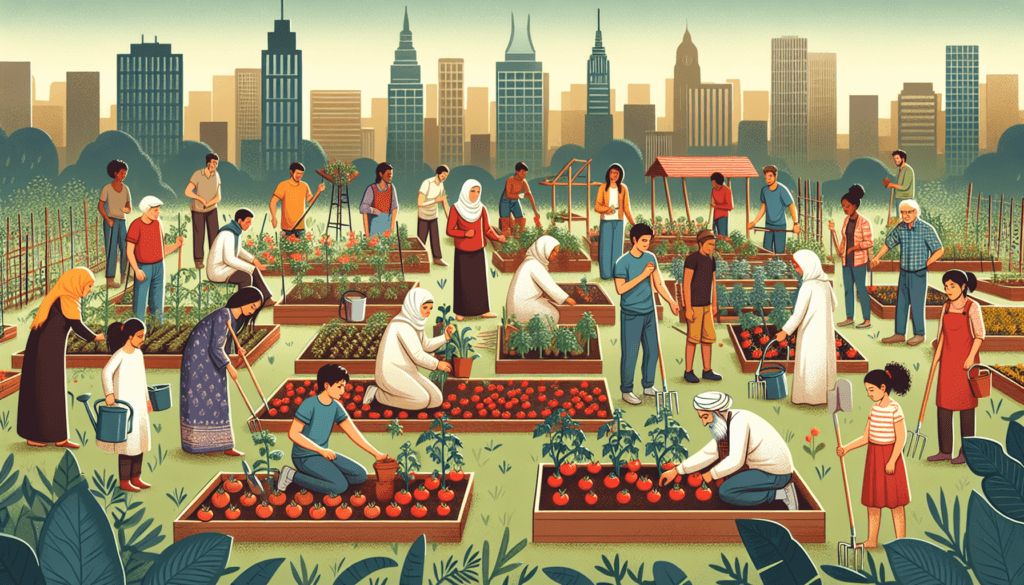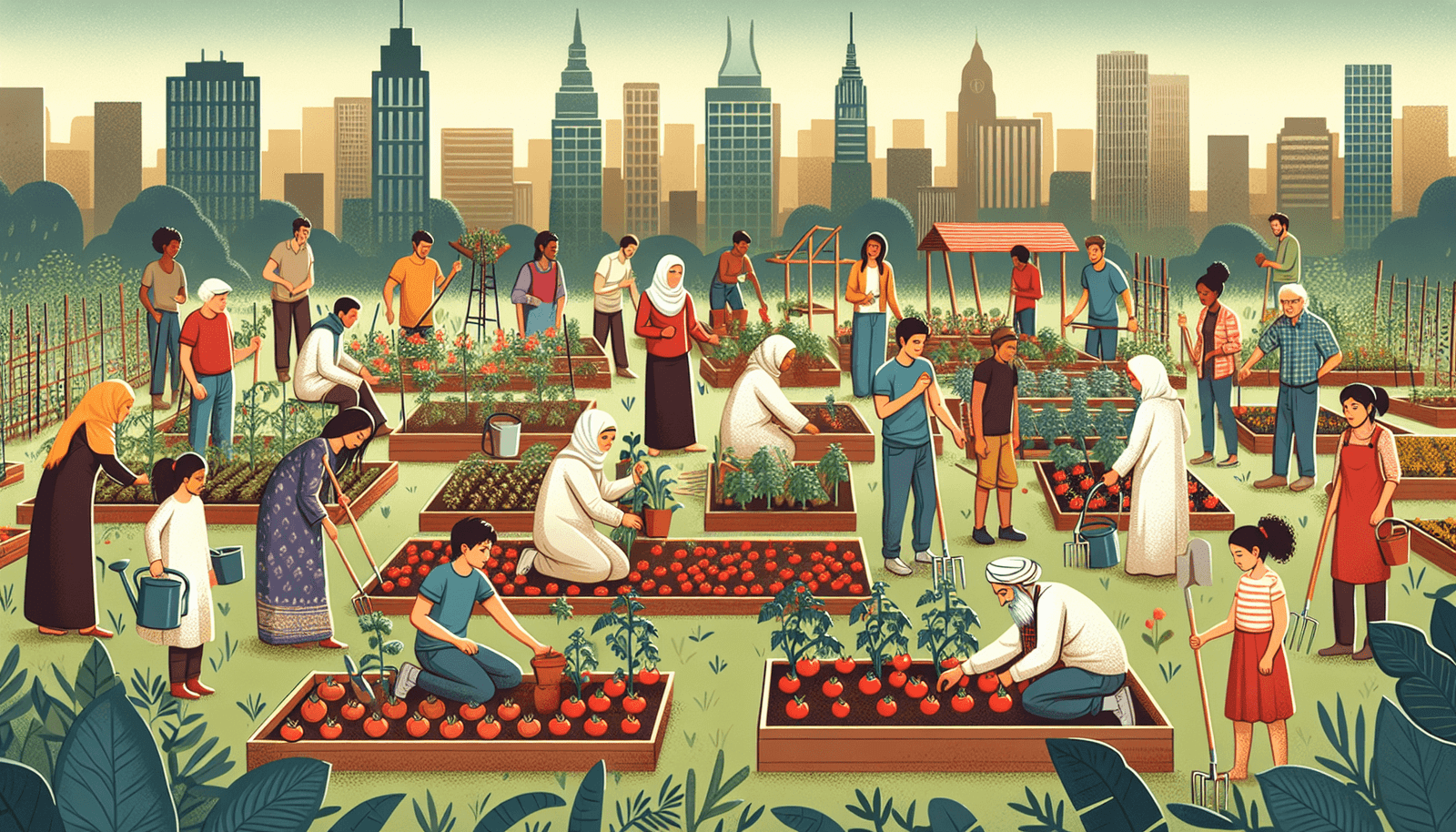Urban community gardens play a vital role in enhancing the well-being of individuals and strengthening the bonds within neighborhoods. These gardens, nestled amidst the concrete jungle, offer a sanctuary where people can connect with nature, foster a sense of community, and reap the numerous benefits of gardening. From improving mental health and promoting physical activity to providing access to fresh, nutritious produce, urban community gardens have become indispensable spaces that breathe life into urban landscapes. So, let’s explore the reasons why these green oases are so significant and why they deserve our attention.

Improving Access to Fresh, Healthy Food
Addressing Food Deserts
Urban community gardens play a vital role in improving access to fresh, healthy food by addressing the issue of food deserts. Food deserts refer to areas where residents have limited access to affordable and nutritious food options. These areas are often characterized by a lack of grocery stores and an overabundance of fast-food restaurants. By establishing community gardens in urban areas, individuals living in food deserts have the opportunity to grow their own fruits, vegetables, and herbs, ensuring they have reliable access to fresh and nutritious produce.
Promoting Food Security
In addition to addressing food deserts, urban community gardens also promote food security. Food security refers to the accessibility, availability, and affordability of food for all individuals. By enabling community members to grow their own food, community gardens contribute to food security by reducing dependence on external food sources. This empowers individuals and families to have a more sustainable and reliable food supply, ensuring they can meet their nutritional needs consistently.
Encouraging Healthy Eating Habits
Urban community gardens foster the development of healthy eating habits. By providing individuals with the opportunity to grow their own food, community gardens promote a stronger connection to the food they consume. This connection often leads to an increased appreciation for fresh produce and a greater inclination to incorporate fruits and vegetables into daily meals. Community gardens encourage individuals to adopt healthier eating habits by providing an accessible and convenient way to access and consume nutritious food.
Fostering Social Connections
Creating Sense of Community
One of the significant benefits of urban community gardens is the creation of a sense of community. These gardens serve as a gathering place for individuals from diverse backgrounds who share a common interest in gardening and sustainable living. Community members come together to cultivate the garden, exchange gardening tips, and engage in conversations, fostering a sense of belonging and camaraderie.
Promoting Social Interaction
Urban community gardens promote social interaction among community members. As individuals work side by side in tending to the garden, they engage in conversations, share stories, and offer support to one another. These interactions not only strengthen social bonds but also encourage the exchange of knowledge and experiences. Community members can learn from each other’s gardening techniques and develop lasting friendships through their shared love for gardening.
Building Relationships
Community gardens serve as a platform for building relationships within the neighborhood. As individuals come together to work towards a common goal, they form bonds and connections that extend beyond the garden. These relationships contribute to a stronger and more connected community, where neighbors support and rely on one another. By fostering relationships, urban community gardens have the power to enhance the overall well-being of individuals and create a sense of belonging in the neighborhood.

Improving Mental Health and Well-being
Reducing Stress and Anxiety
Engaging in gardening activities in urban community gardens can significantly reduce stress and anxiety. Gardening provides a sense of calmness and tranquility, allowing individuals to escape from the pressures of daily life. Being in nature and tending to plants has been proven to have a positive impact on mental health, reducing stress levels and promoting relaxation. The rhythmic motions of gardening, such as digging, planting, and watering, can be meditative, providing a much-needed respite from the stresses of urban living.
Providing Therapeutic Benefits
Urban community gardens offer therapeutic benefits for individuals dealing with mental health issues. Gardening has been recognized as a form of horticultural therapy, which is the use of plants and gardening activities for therapeutic purposes. Engaging in gardening can improve mood, enhance cognitive function, and increase self-esteem. The act of nurturing plants and witnessing their growth provides a sense of purpose, accomplishment, and fulfillment, contributing to overall mental well-being.
Enhancing Mood and Self-esteem
The act of gardening in urban community gardens can have a positive impact on mood and self-esteem. As individuals care for their plants and witness their progress, a sense of joy and fulfillment is experienced. The sight of vibrant flowers blooming or vegetables thriving boosts mood and instills a sense of pride. Additionally, the physical activity involved in gardening releases endorphins, which are known as “feel-good” chemicals, further enhancing mood and self-esteem. Urban community gardens provide individuals with a space to engage in activities that boost their mental well-being and enhance their overall quality of life.
Promoting Environmental Sustainability
Mitigating Urban Heat Island Effect
Urban community gardens play a crucial role in mitigating the urban heat island effect. The urban heat island effect refers to the phenomenon where urban areas experience significantly higher temperatures than surrounding rural areas due to the concentration of heat-absorbing materials such as concrete and asphalt. Community gardens help to counteract this effect by incorporating green spaces that serve as natural cooling agents. Plants and trees in community gardens provide shade, decreasing surface temperatures and creating a more comfortable environment for both gardeners and local communities.
Creating Wildlife Habitat
Urban gardens contribute to the creation of wildlife habitat, promoting biodiversity within the city. When community gardens are established, they provide opportunities for various plant species to thrive, attracting insects, birds, and other wildlife. These green spaces become sanctuaries for native species and support pollinators, which play a critical role in agricultural production. By cultivating urban community gardens, individuals are actively enhancing the local ecosystem and supporting wildlife populations.
Reducing Food Miles and Carbon Footprint
By growing food locally, urban community gardens reduce the distance that produce must travel before reaching consumers. This reduction in food miles leads to a decrease in carbon emissions associated with transportation. Community gardens promote sustainable agriculture practices by emphasizing the importance of consuming locally and reducing reliance on long-distance transportation and industrial agriculture. By supporting urban community gardens, individuals contribute to the reduction of their carbon footprint and the overall environmental impact of the food system.

Education and Skill-building
Teaching about Nature and Agriculture
Urban community gardens serve as outdoor classrooms, providing opportunities for education about nature and agriculture. By engaging in gardening activities, individuals gain knowledge about plant life cycles, soil health, composting, and pest management. These hands-on experiences foster a deeper understanding and appreciation for the natural world and the importance of sustainable agriculture. Community gardens offer a unique setting for individuals of all ages to learn and develop skills related to horticulture and environmental stewardship.
Encouraging Sustainable Practices
Community gardens encourage the adoption of sustainable practices. Through educational programs and workshops, gardeners learn about organic gardening methods, water conservation techniques, and the use of composting to enrich soil health. These sustainable practices promote ecological balance, reduce the use of harmful chemicals, and ensure the long-term viability of urban community gardens. By implementing sustainable practices in their own plots, gardeners become advocates for environmental stewardship and inspire others to adopt similar practices.
Developing Gardening and Entrepreneurial Skills
Urban community gardens provide individuals with opportunities to develop gardening and entrepreneurial skills. As gardeners cultivate and nurture their plots, they acquire knowledge about plant care, pest control, and harvesting. These gardening skills can be applied not only within the community garden but also in personal home gardens. Additionally, the surplus produce grown in community gardens can be sold or exchanged, enabling gardeners to develop entrepreneurial skills and generate income. Community gardens act as platforms for individuals to enhance their abilities and pursue entrepreneurial endeavors related to gardening and sustainable living.
Supporting Biodiversity
Preserving Native Plant Varieties
Urban community gardens contribute to the preservation of native plant varieties, which are often at risk due to urbanization and habitat loss. By intentionally growing native plants, community gardens help to maintain genetic diversity and promote the conservation of indigenous flora. These gardens act as living examples of the importance of preserving native plant species and serve as educational resources for the broader community, raising awareness about the significance of biodiversity.
Providing Pollinator-friendly Spaces
Community gardens create pollinator-friendly spaces in urban areas. By growing a diverse range of flowering plants, community gardeners attract pollinators such as bees, butterflies, and birds. These pollinators play a vital role in facilitating plant reproduction and food production. Creating habitats that support pollinators not only contributes to the health of local ecosystems but also ensures the successful pollination of vegetable and fruit crops, enhancing overall food security. Urban community gardens serve as microcosms of biodiversity, supporting and protecting essential pollinators.
Creating Corridors for Wildlife Movement
Urban community gardens, when established strategically, can create corridors for wildlife movement. These green spaces act as stepping stones within the urban landscape, connecting fragmented habitats and allowing wildlife to travel between larger natural areas. By incorporating native plants and providing refuge for wildlife, community gardens function as important links in urban ecological networks. They enable the migration of species and support the movement of wildlife, contributing to the conservation of urban biodiversity.

Beautifying Urban Spaces
Transforming Vacant Lots
Urban community gardens have the power to transform vacant lots into vibrant and aesthetically pleasing spaces. Vacant lots are often eyesores in urban environments, attracting trash and becoming a breeding ground for pests. Community gardens not only revitalize these empty spaces but also add beauty and color to otherwise unattractive areas. The sight of well-maintained gardens replaces the desolation of abandoned lots, improving the overall aesthetic appeal of the neighborhood.
Enhancing Aesthetics
The presence of urban community gardens enhances the aesthetics of urban spaces. Lush greenery, vibrant flowers, and well-cared-for vegetable patches create visually pleasing landscapes. The natural beauty of community gardens brings a sense of serenity and tranquility to urban environments, providing a welcome break from concrete and asphalt. Gardens attract the attention of passersby, encouraging community members to stop and appreciate the beauty of nature in the midst of the urban landscape.
Adding Greenery
Community gardens contribute to the addition of greenery in urban spaces. In densely populated areas, green spaces are often limited, leading to a lack of contact with nature. Urban community gardens provide an opportunity to introduce vegetation into urban environments, delivering numerous benefits. The presence of greenery improves air quality, reduces noise pollution, and contributes to the overall visual appeal of the neighborhood. By adding green spaces, community gardens create a more pleasant and livable urban environment for residents.
Strengthening Economic Resilience
Generating Local Jobs
Urban community gardens contribute to the generation of local jobs. These gardens require maintenance, organization, and management, creating opportunities for employment within the community. Jobs in community gardens can include positions such as garden coordinators, educators, and maintenance staff. Additionally, the surplus produce from the gardens can be sold, providing opportunities for individuals to generate income through food sales or farmers’ markets. By fostering economic activity at the local level, community gardens contribute to the strength and resiliency of the neighborhood.
Boosting Neighborhood Property Values
The presence of urban community gardens has been shown to boost neighborhood property values. Studies have indicated that proximity to green spaces, such as community gardens, can increase property values, making the area more attractive to potential homeowners and investors. Community gardens are seen as desirable amenities that improve the livability and aesthetics of a neighborhood, contributing to the overall appeal of the area. By uplifting property values, community gardens play a role in enhancing the economic well-being of the neighborhood.
Supporting Local Economy
Urban community gardens support the local economy by encouraging local food production and consumption. By growing food locally, community members support small-scale farmers and local food producers, contributing to local economic development. The sale and exchange of surplus produce from community gardens can also stimulate economic activity, supporting farmers’ markets and local businesses. Moreover, community gardens often promote entrepreneurship and offer individuals the opportunity to develop small-scale enterprises related to gardening and sustainable living. By encouraging local economic resilience, community gardens contribute to the overall well-being of the neighborhood.

Encouraging Active Lifestyles
Providing Opportunities for Physical Activity
Urban community gardens provide opportunities for physical activity within the neighborhood. Gardening involves various physical movements, such as digging, planting, and weeding, which offer exercise benefits. Engaging in regular physical activity can improve cardiovascular health, strengthen muscles, and enhance flexibility. Community gardens offer an accessible and enjoyable way for individuals to incorporate physical activity into their daily routines. By providing spaces for gardening activities, community gardens promote active lifestyles among community members.
Improving Access to Green Spaces
Access to green spaces is a vital component of leading an active and healthy lifestyle. Unfortunately, many urban areas lack sufficient green spaces for residents to engage in physical activities or simply relax in nature. Urban community gardens address this issue by providing accessible green spaces within the neighborhood. These gardens serve as outdoor recreational areas where individuals can engage in gardening, exercise, and leisure activities. By improving access to green spaces, community gardens encourage individuals to embrace active lifestyles and prioritize their physical well-being.
Promoting Healthy Living
Engaging in gardening activities in urban community gardens promotes healthy living. Gardening requires individuals to spend time outdoors, soaking up vitamin D from the sun. Exposure to sunlight can enhance mood, help regulate sleep patterns, and provide essential nutrients. Additionally, growing one’s own food leads to a greater consumption of fresh fruits and vegetables, which are essential for a balanced and nutritious diet. By promoting healthy living through physical activity and access to fresh produce, community gardens contribute to the overall well-being of community members.
Educating and Empowering Youth
Teaching Environmental Stewardship
Urban community gardens play a crucial role in teaching environmental stewardship to younger generations. By involving youth in gardening activities, community gardens provide an opportunity to educate them about the importance of caring for the environment. Children learn about plant life cycles, sustainable farming practices, and the interdependence of ecosystems. These lessons foster a sense of responsibility and encourage youth to become advocates for environmental conservation. Community gardens empower youth by equipping them with the knowledge and skills necessary to make a positive impact on the planet.
Encouraging Youth Engagement
Community gardens encourage youth engagement by providing a space for young individuals to actively participate in community-building activities. Engaging in gardening provides young people with a sense of ownership and responsibility. They learn about teamwork, cooperation, and the rewards of hard work. Community gardens offer opportunities for youth to take on leadership roles, organize events, and engage in decision-making processes. By involving youth in community gardens, they become invested in the well-being of their surroundings, fostering a sense of civic pride and empowerment.
Fostering Leadership and Responsibility
Urban community gardens foster leadership skills and a sense of responsibility among youth participants. Through their involvement in planning, planting, and care of the garden, young individuals learn to take charge and assume leadership roles. They develop critical thinking skills, problem-solving abilities, and decision-making capabilities. Community gardens provide a nurturing environment that nurtures the growth of young leaders, empowering them to take on challenges and contribute to the betterment of their communities. By fostering leadership and responsibility, community gardens shape the future generations of environmentally conscious and socially responsible individuals.
In conclusion, urban community gardens are incredibly important for numerous reasons. They improve access to fresh, healthy food, promote food security, and encourage healthy eating habits. They foster social connections, create a sense of community, and build relationships among community members. Furthermore, community gardens have a significant positive impact on mental health and well-being by reducing stress and anxiety, providing therapeutic benefits, and enhancing mood and self-esteem. They also play a vital role in promoting environmental sustainability by mitigating the urban heat island effect, creating wildlife habitat, and reducing food miles and carbon footprints. Community gardens contribute to education and skill-building by teaching about nature and agriculture, encouraging sustainable practices, and developing gardening and entrepreneurial skills. They support biodiversity by preserving native plant varieties, providing pollinator-friendly spaces, and creating corridors for wildlife movement. Urban community gardens beautify urban spaces by transforming vacant lots, enhancing aesthetics, and adding greenery. They strengthen economic resilience by generating local jobs, boosting neighborhood property values, and supporting the local economy. Moreover, community gardens encourage active lifestyles by providing opportunities for physical activity, improving access to green spaces, and promoting healthy living. Lastly, community gardens educate and empower youth by teaching environmental stewardship, encouraging youth engagement, and fostering leadership and responsibility. With their multitude of benefits, urban community gardens are truly essential for the well-being and sustainability of urban communities.


